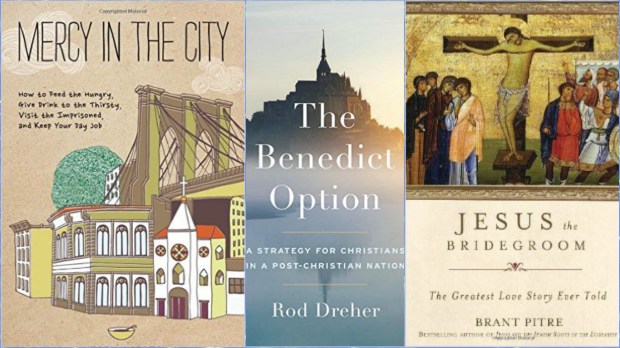Lenten Campaign 2025
This content is free of charge, as are all our articles.
Support us with a donation that is tax-deductible and enable us to continue to reach millions of readers.
A friend told me recently that she’s been finding it difficult to get her brain in gear. “I can’t read anything longer than a Facebook post! I think all of these years online have wrecked my ability to concentrate. It’s like I can’t just make myself behave, tamp the constant urge to check email or social media and really, fully read something. My life is becoming a continuous distracted loop that begins with ‘Squirrel!’ and ends with me typing ‘tl;dr’ on ever-shorter posts, even in Goodreads.”
“Well, thank God for Lent,” I replied, all-too-readily sympathizing with her plight, because I, too, have felt that “distracted loop” tearing into my concentration. Picking up from a monastic tradition, my friend and I have decided to “assign” each other a book to read during Lent. I can’t wait to see what she has in store for me.
In monastic houses, particularly in those following the Rule of St. Benedict (Benedictines and Trappists, among others), part of Lenten observation was to be spent in reading: During the days of Lent, they should be free in the morning to read until the third hour. . . . During this time of Lent each one is to receive a book from the library, and is to read the whole of it straight through. These books are to be distributed at the beginning of Lent. (RB, 48:14-16).
St. Benedict deemed that study and sacred reading should be a part of every monastic’s day, but especially in Lent, everyone in the community — whether a scholar or a latrine-digger — must read.
Learn more: The great liberating power of the St. Benedict Medal
Pre-Vatican II, it was not unusual for an abbot or abbess to spend some time consulting with the abbey’s librarian as to which books would be suitable reading for individual monks or nuns. The librarian might mention that someone had read no Aquinas and suggest a book. Or the abbess might decide that a smarty-pants nun needed a bit of a challenge, and so she’d assign a difficult book, perhaps one in Latin. Sometimes the selection would be a surprising, completely secular book.
Benedictines and Trappists (and lay people formally associated with their monastic houses — called Oblates, or Associates) still follow the Rule and engage in reading specific to Lent. Nowadays, rather than individually selected books, chosen by the abbot for each monk, most monastic houses list a selection of recommended reading for the community to choose from.
Perhaps you, too, have been feeling like your time spent on the internet has affected your ability to read at length, or at depth. The season of Lenten discipline is a very good time to retrain the brain to focus — in prayer, in life, and yes, in reading. We hope these recommendations (presented in no particular order) will entice you to spend some quiet, focused, time in reading.

Jesus the Bridegroom: The Greatest Love Story Ever Told by Brant Pitre. In 2011 I gave Pitre’s Jesus and the Jewish Roots of the Eucharist to all the priests in my parish, because it was that good. Jesus the Bridegroomis an absolutely splendid follow-up; it’s another book that both informs and thrills. If you’ve wondered what Saint Paul meant when he compared Christ’s torturous crucifixion to a Divine Wedding, this will answer you, and you will be moved to awe.
Jesus of Nazareth By Pope Benedict XVI (or really any part of his trilogy on the life of Christ). These are highly readable books, full of insight and simply, hands down, perfect for Lent. And you don’t have to be Catholic to love them.
Provocations: Spiritual Writings of Kierkegaard. Because this:
The difference between an admirer and a follower still remains, no matter who you are. The admirer never makes any true sacrifices. He always plays it safe. Though in words, phrases, songs, he is inexhaustible about how highly he prizes Christ, he renounces nothing, gives up nothing, will not reconstruct his life, will not be what he admires, and will not let his life express what it is he supposedly admires.
How ’bout that? Lent is a good time for strong medicine.
For new releases, I can personally recommend Archbishop Charles J. Chaput’s latest book, Strangers in a Strange Land: Living the Catholic Faith in a Post-Christian World. I’m only on Chapter 3 but from his opening paragraph, the Archbishop gives us a thoughtful, accessible, very readable assessment of the state of the Church and the world and “Where we go from here.”
For those taken by the notion of The Benedict Option and why it might be coming to your neigborhood, Rod Dreher’s book specific to the subject, The Benedict Option: A Strategy for Christians in a Post-Christian Nation, is on pre-order, and might be right up your alley.
Almost nothing is more valuable to one’s prayer life than Magnificat magazine, and so it follows — very aptly — that almost nothing is more valuable for our 2017 Lenten meditations than the Magnificat Lenten Companion and yes, there’s an app for that. Fans of Magnificat’s pocket-sized monthly collection of daily Mass readings, prayers and spiritual reflections will definitely want to pick up this Lenten supplement, which is chock full of devotions, essays, poems and meditations from the best Catholic writers both past and present.
Introduction to the Devout Life, by St. Francis de Sales. This down-to-earth manual on authentic everyday Christianity is just as relevant now as it was 400 years ago — in fact, much of it reads as if it could have been written today.
With God in Russia, by Fr. Walter J. Ciszek SJ. Recently there has been lots of talk about totalitarian regimes. Ciszek lived it. He lived it.

Mercy in the City: How to Feed the Hungry, Give Drink to the Thirsty, Visit the Imprisoned, and Keep Your Day Job, by Kerry Weber. Simply perfect Lenten reading.
Simplifying the Soul: Lenten Practices to Renew Your Spirit by Paula Huston. I have recommended this book before (and Kerry Weber’s too), because they are both really useful, really helpful, really practical books that can help put Lenten thoughts into action. Lent calls us to simplify — Huston shows us how. Lent calls us to look to the other — Weber shows us how. And neither writer is scary about it.
If the Church has left you feeling unsettled lately, find some steadying in Tom Hoopes’ book What Pope Francis Really Said: Words of Comfort and Challenge.
St. Philip Neri strongly recommended that the faithful remain inspired by reading the lives of the saints. Bert Ghezzi’s Voices of the Saints is an unusually well-written, unsentimental collection of well-known and obscure saints, and it includes some of their writing. I frankly love this book, which is really not like any other out there.
Finally, if you’ve read this far, indulge me a little as I recommend my own small book Little Sins Mean a Lot, which is very much a self-help book for Lent that got released at the “wrong time” last year but really is meant to help us work on ourselves and all of the “little sins” we permit without considering how connected they are to the deadly ones. It’s a practical book, and a pretty personal one. The Amazon page is terrible but you can read reviews about it here and here and here.
And of course, if you want to know how we got to where we are today — in all our madness — there is always this book.
UPDATE: We have heard your request for a fiction read in Lent. Read Michelle Buckman’s award-winning novel, Rachel’s Contrition, right here at Aleteia, where we are publishing a chapter a day, all through Lent. Chapter 1 is here!
Read more: A Millennial’s Guide to Lent

